 Apologies for the delay, lovely reader. And -- truth be told -- a few days have elapsed since Lulu re/screened the first of the 1962 nominated performances. Yet...no post. 'Tis been like pooping pinecones to get the motivation to tap out this waylaid/way-late entry into the Supporting Actress Sunday catalogue. Crazy too that it ain't the performance's fault, because there really are few acting feats as extraordinary as the performance put on film by...
Apologies for the delay, lovely reader. And -- truth be told -- a few days have elapsed since Lulu re/screened the first of the 1962 nominated performances. Yet...no post. 'Tis been like pooping pinecones to get the motivation to tap out this waylaid/way-late entry into the Supporting Actress Sunday catalogue. Crazy too that it ain't the performance's fault, because there really are few acting feats as extraordinary as the performance put on film by...The Miracle Worker tells the story of Annie Sullivan (played here by the formidable Anne Bancroft in an Oscar-snagging performance), the teacher who taught the deaf and blind Helen Keller to communicate. The narrative itself is gruelingly simple: will Annie be able to get through to Helen (revealing that she is a child capable of learning and loving), or will Helen break Anne's will to teach her (proving that the profoundly handicapped are irredeemably less than human)... Any guesses how things turn out?
The Miracle Worker itself is like a theatrical zombie.
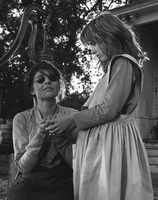 Produced over and over again, with generational stunt casting galore, no one seems able to kill it. (Though Nathaniel's -- ahem -- favorite actress recently came close.) StinkyLulu goes back & forth on whether the enduring appeal derives from the narrative being (a) a twin-set "triumph of the human spirit" female characters or that it's basically (b) one extended fight scene in which two female performers get to smack the bejeebus out of each other. O'course, it doesn't hurt that the dramatic structure trudges unrelentingly toward one of the singularly electrifying climactic moments in 20th century dramatics: the moment of redemption when Helen makes the connection and Annie gets to holler: "W-A-T-E-R... Water. It has a name. Mrs. Keller! Mrs. Keller! She knows..." 'Tis a guaranteed goose-pimpler.
Produced over and over again, with generational stunt casting galore, no one seems able to kill it. (Though Nathaniel's -- ahem -- favorite actress recently came close.) StinkyLulu goes back & forth on whether the enduring appeal derives from the narrative being (a) a twin-set "triumph of the human spirit" female characters or that it's basically (b) one extended fight scene in which two female performers get to smack the bejeebus out of each other. O'course, it doesn't hurt that the dramatic structure trudges unrelentingly toward one of the singularly electrifying climactic moments in 20th century dramatics: the moment of redemption when Helen makes the connection and Annie gets to holler: "W-A-T-E-R... Water. It has a name. Mrs. Keller! Mrs. Keller! She knows..." 'Tis a guaranteed goose-pimpler.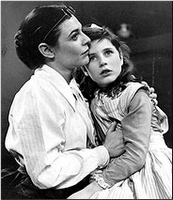 The film does a decent job of escalating the incremental intensity, adding some nifty camera angles & close-ups. (Though the filmmakers also layered some auteurist atrocities -- blurry figures in flashback, ostensibly the ghosts haunting Anne Sullivan's interior psychodrama -- that are just astonishingly bad.) The real value, though, of the flick is that it captures the two legendary Broadway performances -- Bancroft and Duke -- at the narrative's center.
The film does a decent job of escalating the incremental intensity, adding some nifty camera angles & close-ups. (Though the filmmakers also layered some auteurist atrocities -- blurry figures in flashback, ostensibly the ghosts haunting Anne Sullivan's interior psychodrama -- that are just astonishingly bad.) The real value, though, of the flick is that it captures the two legendary Broadway performances -- Bancroft and Duke -- at the narrative's center.Though Bancroft's career brought no end of great roles (and 2 more Oscar noms), Patty Duke's performance as Helen Keller remains the actress' only real brush with critical acclaim. (Not counting the raving lunacy inspired by VOD.) Yet, it's a performance Patty Duke originated at age 12
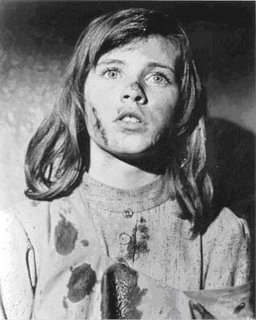 -- a role that, by the beginning of the shoot, Duke had been performing with little interruption for nearly three years. Perhaps as a result, Duke's performance as captured on screen is a marvel of intricacy and precision. Nearly mute, with her eyes bugged open, Duke nonetheless anchors Helen's every grab and every grimace in actorly intention and dramatic action. There's no doubt there's an authentic person gnawing and scratching inside this little beast/girl. But a chilling moment occurs when a secondary character diminishes Annie Sullivan's teaching efforts by likening Helen to a trained monkey. The script means this to suggest Sullivan's vision, her empathy, her tenacity.
-- a role that, by the beginning of the shoot, Duke had been performing with little interruption for nearly three years. Perhaps as a result, Duke's performance as captured on screen is a marvel of intricacy and precision. Nearly mute, with her eyes bugged open, Duke nonetheless anchors Helen's every grab and every grimace in actorly intention and dramatic action. There's no doubt there's an authentic person gnawing and scratching inside this little beast/girl. But a chilling moment occurs when a secondary character diminishes Annie Sullivan's teaching efforts by likening Helen to a trained monkey. The script means this to suggest Sullivan's vision, her empathy, her tenacity. 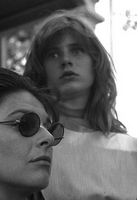 But, screening this movie 40 years later, a creepy truth echoes within that accusation...an encroaching sense that it's not Helen who's the performing monkey, but the actress, Patty Duke. The actress, who became an enormous star at 16 due to this and her eponymous tv show, has told of her struggles with the downside of being a former child star... And, for StinkyLulu at least, this film seem to document both Patty Duke's exceptional accomplishment in the role as well as the curious collateral damage it did to Patty Duke herself. So, while there's much to admire in Patty Duke's performance, the whole thing just creeps Lulu out.
But, screening this movie 40 years later, a creepy truth echoes within that accusation...an encroaching sense that it's not Helen who's the performing monkey, but the actress, Patty Duke. The actress, who became an enormous star at 16 due to this and her eponymous tv show, has told of her struggles with the downside of being a former child star... And, for StinkyLulu at least, this film seem to document both Patty Duke's exceptional accomplishment in the role as well as the curious collateral damage it did to Patty Duke herself. So, while there's much to admire in Patty Duke's performance, the whole thing just creeps Lulu out.Even more, the true Best Supporting Actress in this flick is actually the brilliant, heartbreaking and unnominated Inga Swenson (Lulu's beloved Kraus, herself) as Helen's beseiged mother. An exhilarating example of great actressing at the edges, Swenson's performance tethers the extraordinariness of the story to an intrinsic, human emotional reality: a mother's desperate desire to connect with the child she loves. But Swenson's Mrs. Keller ain't no sugary portrait of maternal love as an elemental force. No, Swenson's is a bravely unattractive performance, which also avoids most of the goopy sentimental potholes. Swenson hits all kinds of vivid notes -- loathing, despair, joy, fury, wretched disappointment -- within pitifully banal dialogue, a genteel southern accent and often acting opposite the nearly intolerable Victor Jory (all those years shouting on a hillside sure didn't school his subtlety). Indeed, Inga Swenson's might well be the best performance in this acclaimed flick. (But that's just what StinkyLulu sez...)
But Joan Crawford said 1962's Best Supporting Actress 'twas Patty Duke
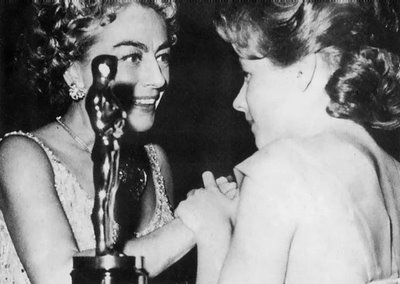
And apparently, Oscar agreed.
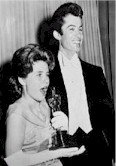
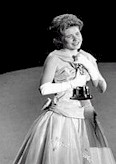
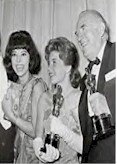
Wonder what the Smackdowners will say...

And apparently, Oscar agreed.



Wonder what the Smackdowners will say...
(Tune in Sunday, when Supporting Actress Sunday'll be back on track, for StinkyLulu's comments on the performance that contemporary Oscar wags thought sure to snag the Best Supporting trophy in 1962, Angela Lansbury in The Manchurian Candidate...)

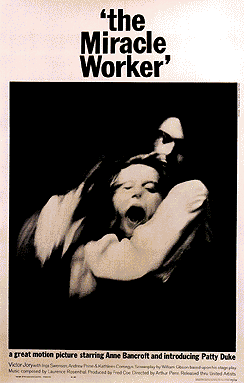
No comments:
Post a Comment